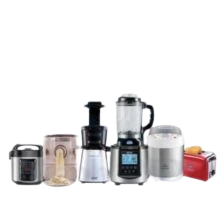Get A Quote
BIS Certification for Commercial Electric Kitchen Machines IS 302 (Part 1): 2024

The BIS Certification for Commercial Electric Kitchen Machines confirms that these products comply with the stringent standards established by the Bureau of Indian Standards (BIS). This certification assures adherence to safety, quality, and performance benchmarks, making it vital for manufacturers and enterprises in the food service sector.
With this certification in place, commercial electric kitchen machines are validated for secure operation, resilience, and effectiveness. Securing BIS Certification for Commercial Electric Kitchen Machines is essential for businesses dedicated to providing dependable, high-quality equipment to their clients, thereby enhancing consumer trust and ensuring regulatory adherence.
The BIS Certification for Commercial Electric Kitchen Machines is a crucial component in ensuring the safety, quality, and compliance of these products as per the Safety of Household, Commercial, and Similar Electrical Appliances (Quality Control) Order, 2024. This certification guarantees that commercial kitchen appliances adhere to established safety standards, providing dependable performance while reducing risks for users. As a BIS certification consultant for commercial electric kitchen appliances, we assist manufacturers throughout the certification process, ensuring regulatory compliance and offering expert guidance to facilitate a smooth certification experience.
Why is BIS Certification Necessary for Commercial Electric Kitchen Machines IS 302 (Part 1): 2024?
The BIS Certification for Commercial
Electric Kitchen Machines IS 302 (Part 1): 2024 is vital to guarantee the
safety, performance, and reliability of these machines in commercial settings.
This certification process entails thorough testing against Indian safety and
quality standards, safeguarding consumers from potential hazards such as
electrical failures, fire risks, and mechanical issues. Securing BIS
certification signifies a dedication to high-quality standards, compliance with
legal requirements, and fostering consumer confidence. For businesses, it also
facilitates market entry and bolsters brand reputation. Thus, BIS Certification
for Commercial Electric Kitchen Machines is indispensable for ensuring safety
and quality compliance.
Overview of Indian Standard IS 302 (Part 1): 2024
The Indian Standard IS 302 (Part 1): 2024
specifies the safety and performance criteria for commercial electric kitchen
machines utilized in the food service sector. This standard ensures that
equipment, including mixers, grinders, and blenders, comply with defined
electrical, mechanical, and safety specifications. Adhering to IS 302 (Part 1):
2024 confirms that these machines are safe for operation, reliable, and
energy-efficient, thereby reducing risks for both operators and consumers. To
achieve BIS Certification for Commercial Electric Kitchen Appliances,
manufacturers are required to follow these rigorous standards, thereby ensuring
product safety and quality.
Process for BIS Certification
The BIS
certification process for BIS certification for Commerical Electric Kitchen
Machines involves multiple steps designed to thoroughly evaluate a product's
compliance with the required standards. Here is a general overview of the
certification process:
1. Application
Submission: Manufacturers must submit an application form along with the
required documentation to BIS.
2. Documentation
Review: BIS reviews the submitted documents to ensure completeness and
correctness.
3. Factory
Inspection: BIS officials conduct an on-site inspection of the manufacturing
facility to assess the production process and quality control measures.
4. Sample Testing:
Product samples are taken and tested in BIS-approved laboratories to verify
compliance with Indian standards.
5. Certification
Grant: Upon successful completion of the inspection and testing, BIS grants
certification, allowing the manufacturer to use the BIS mark on their products.
Documents Required for BIS Certification
To apply for BIS certification, manufacturers need to submit the following documents:
● Application form
● Manufacturing process details
● Quality control plan
● Test reports from BIS-approved laboratories
● Factory layout and equipment details
● Proof of business registration
● Product specifications and technical details
● Declaration of conformity to Indian standards
Additionally, manufacturers may be required to provide proof of compliance with environmental and safety regulations, depending on the specific type of product being certified.
BIS ISI Mark Certification Costing And Timeline
To Know The Process in Detail, Please Visit:
Under BIS Registration Products ISI and CRS
Conclusion
Securing BIS Certification for Commercial
Electric Kitchen Machines is essential for ensuring product safety, quality,
and adherence to Indian regulatory standards. This certification not only
bolsters the credibility of the product but also reassures consumers of its
reliability and longevity. Manufacturers pursuing BIS certification can
effectively meet rigorous safety standards, thus fostering the growth of the
commercial kitchen sector. At EVTL India, we specialize in assisting businesses
throughout the intricate process of obtaining BIS Certification for Commercial
Electric Kitchen Machines. Our expert consultancy guarantees that manufacturers
meet the requisite requirements and achieve certification seamlessly, thereby
enhancing the marketability and reputation of their products. With our
customized services, businesses can navigate the certification journey with
assurance, ensuring complete regulatory compliance and a competitive advantage
in the marketplace.
Free Call Back
Latest News & Update
📅 BIS Critical Component List (CCL) Updates for Solar PV Modules
🕒 BIS Fee Concessions for MSMEs and Startups | EVTL India
📅 Guidelines for Implementation of Essential Requirements for Security of CCTV
🕒 Omnibus Technical Regulation (OTR) Amendment Order, 2025
🕒 Extension of Timeline for Filing Annual Returns by Battery Producers
📅 Extension of Timeline for Filing Quarterly and Annual Returns for E-Waste
🕒 Extension of Concurrent Running Period for IS 302-1: 2008 and IS 302 (Part 1): 2024
🕒 BIS Guidelines for Grant of Licence (GoL) | EVTL India
📅 CPCB Guidance on filing of Application, Fees and more
🕒 CPCB Notification on Labelling of Plastic Packaging
📅 Mandatory Compliance for Input Materials of Steel and Steel Products for Imports
🕒 BIS Guidelines for Scheme-X Certification for OTR-Regulated Products
📅 BIS Upgrades Product Certification License Numbers to 10-Digit Series
🕒 BIS Certification No Longer Mandatory for 14 Chemical & Polymer Categories
Why Choose EVTL INDIA
Expertise in Indian Regulatory Standards
End-to-End Support
Trusted by Top Indian & Global Brands
Fast Processing & Transparent Pricing
Strong Liaison with Indian Authorities
Company Profile














